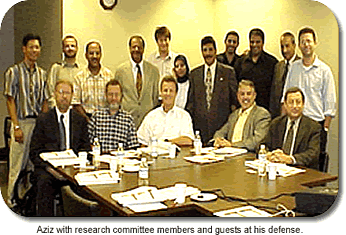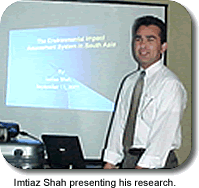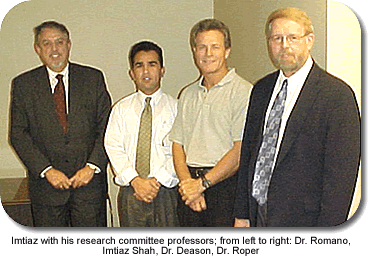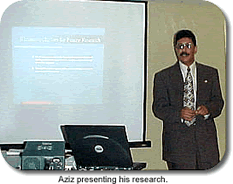Three doctoral candidates of the E&EM Program successfully defended their dissertation research and earned their doctoral degrees.
Abdulaziz (Aziz) F. Al-Buainain received his B.Sc. degree in Applied Civil Enginnering in 1984 from the King Fahad University of Petroleum and Minerals in Saudi Arabia. He obtained an M.Sc. degree in Engineering Management (Construction Management) from GW in 1998. He has extensive work experience as a civil engineer in the Arabian American Oil Company and the Bahrain National Oil Company. he also served as a directorate in the Bahrain Defense Force, Military Works. He is a member of several organizations, including the American Society of Civil Engineers (ASCE), the Bahrain Society of Engineers, and the Construction Institute (USA).

Recently, Aziz earned his D.Sc. degree from the Engineering Management Department at GW by defending his research on "The Building Construction Industry Waste Minimization and Management Strategy for the GCC Countries Represented by the Kingdom of Bahrain."
Aziz observed that non-hazardous building construction wastes were recoverable, and therefore valuable, but were not managed and valued properly. He saw that these wastes created an environmental concern, due to the limited capacities of landfills. Aziz noted that most of the developed countries had decreased this environmental impact by developing waste management plans and applying them accordingly. However, as Aziz pointed out, the Kingdom of Bahrain and other Gulf Cooperation Council (GCC) countries were experiencing a rapid development in building construction, but had inadequate strategies for managing the waste created by this industry.
Aziz investigated and analyzed the Bahrain building construction industry and evaluated their response to waste management models adapted from the US, UK and Australia. He found that there was a high level of acceptance and application. Aziz identified the charactersitics and current practices of the Bahrain building construction industry and as a result of his research, developed a model for the application of best waste management strategies for Bahrain and other GCC countries.
Click here to view the abstract of Aziz's dissertation.
![]()

Imtiaz Shah received his undergraduate abd graduate degrees from the Peshawar Engineering University in Pakistan. he has seven years of professional experience in water resources engineering.
Imtiaz recently defended his research proposal, "The Environmental Impact Assessment System in South Asia." Imtiaz looked into the region of South Asia and observed that the region was facing serious environmental problems, due to increased economic growth and the lack of adequate environmental management systems to provide a sustainable growth. The region's environmental concerns include resource depletion and degradation, indoor and urban air pollution, lack of access to clean water supplies and sanitation, toxic and hazardous wastes, and vulnerability to natural disasters, noted Imtiaz. He indicated that factors such as the lack of incentives for resource conservation, an insufficient institutional framework for the integrated management of natural resources, inadequate legal and policy frameworks, the lack of public awareness, and limited data all contribute to increasing the environmental damage and impeding the attempt to reach sustainability.

Imtiaz pointed out that the Environmental Impact Assessment (EIA) process as an instrument of preventive management that aims to identify, analyze, quantify, and mitigate the environmental impact of activities and that several South Asian countries had recently realized the importance of EIAs and strated implementing them. Imtiaz indicated that environmental analysis methodologies and processes differed between countries, and suggested that EIA systems, principles, and procedures needed to be harmonized on a regional basis.
Click here to view more detail on Imtiaz's proposal.
![]()
Travis P. Wagner holds an A.A.S. degree (1982) and a B.S. degree (1983) from the Unity College in Maine. He also received an M.P.P. degree (1998) from the University of Maryland, College Park.
This past May (2002), Travis earned his Ph.D. degree from the Columbian College of Arts and Sciences (Environmental and Natural Resources Policy) of GW by defending his research on "A Comparative Analysis of EPA's Reliance on Risk Assessment in its Contaminated Site Remediation Programs."

Travis observed that the Environmental Protection Agency (EPA) has three site remediation programs that have many similarities in terms of context, process, data requirements, and objectives, but they differ in their reliance on risk assessment on determining the extent of clean-up. He performed a comparative case study analysis and studied internal and external documentation, in order to examine the impact that various technical, political, social, economic and organizational factors have on the reliance on risk assessment of each one of EPA's remediation programs.
As a result of his research, Travis discovered that the various factors had different effects, depending on the remediation program and concluded that risk assessment has become an economic decision and that it is vulnerable to biases within the organization. As a policy, he recommended that the risk assessment not be mandated, the standardized clean-up goals be increased, and that all site remediation programs be merged into one program office.
Click here to view the abstract of Travis' dissertation.


